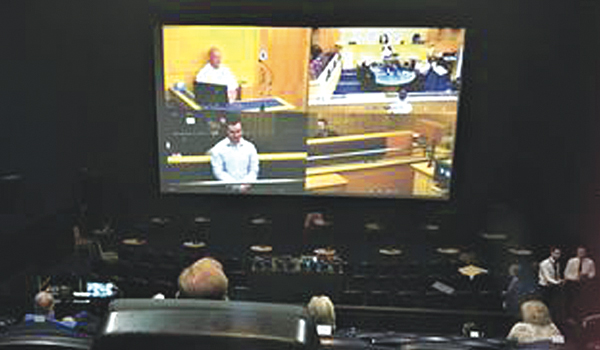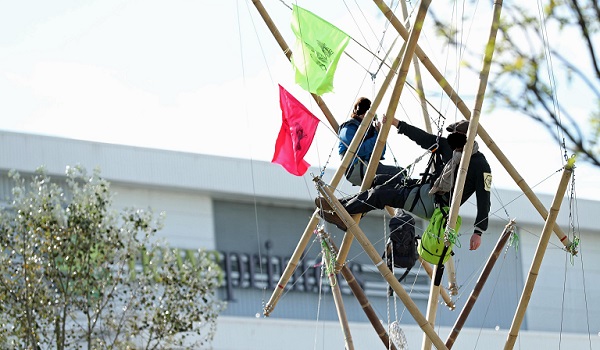Remote jury centres to be extended to tackle backlog of trials
Remote jury centres are to be extended across Scotland to re-start sheriff court jury trials that have been delayed as a result of Covid-19.
It is estimated that more than 2,000 sheriff court jury trials will be outstanding by March 2021.
Victim Support Scotland says the real life and negative impact of these delays on people impacted by crime “cannot be underestimated”.
The Scottish government announced today (October 2) that it is allocating £6.5 million in funding to enable the new remote jury centres to deliver capacity for 18 jury trial courts to operate.
These centres enable juries to participate in trials from venues other than court buildings, such as cinema complexes, allowing the number of trials taking place to increase substantially.
The move, endorsed by Lady Dorrian’s Restarting Solemn Trials Working Group, will replicate the High Court approach in sheriff courts across the country.
The Edinburgh High Court remote jury centre in the Odeon cinema at Fort Kinnaird retail park sat for the first time on Tuesday (September 29) – the first such centre in the UK – and the Glasgow High Court centre at Braehead, Renfrewshire, is programmed to hear trials from October 12.
Courtrooms have been fitted out with the cameras and technology necessary to broadcast the trials to the screens and to receive the video wall of jurors into the courtroom.
Ronnie Renucci QC, Vice-Dean of Faculty and president of the Scottish Criminal Bar Association, said the use of cinemas as remote jury centres was “an innovative and unique solution to the problem of conducting jury trials during the present restrictions”.
“More importantly it is a workable solution that allows jury trials to proceed at a sustainable level, which should prevent the present backlog rising further,” he added.
A cross-justice group involving the legal profession and third sector, led by Sheriff Principal Turnbull, will focus on the practical differences in hearing sheriff court jury trials to help restart them quickly and effectively.
Lady Dorrian said: “The innovative approach to remote jury centres in the High Court is now up and running and the next stage is to plan the roll-out of this approach to sheriff court jury trials.
“This is an excellent collaborative effort across the justice sector which will increase court capacity in an environment that is safe for all participants.”
Eric McQueen, chief executive of the Scottish Courts and Tribunals Service (SCTS), said: “The great advantage of these remote jury centres is that they provide, in a single building, a number of spacious and soundproofed auditoria that can comfortably accommodate 15 physically distanced jurors, combined with state-of-the-art secure technology. It also means we have a model that can be replicated at various sites around the country.
“Everyone who saw the test set-up was impressed both by the quality of audio-presentation of court proceedings, and by the way in which the cinema complexes can be transformed into centres that properly reflect the solemnity of court proceedings.”
Justice Secretary Humza Yousaf said the introduction of remote jury centres for sheriff court trials will provide assurance to victims, witnesses and accused who have been adversely affected by case delays due to Covid-19.
He said the £6.5 million funding for these centres will allow sheriff court trials to “proceed as quickly as possible”.
“This is in addition to the £5.5 million already provided for High Court jury centres and £3 million for court technology. Excellent progress has already been made, including the resumption of High Court trials in Edinburgh this week using the remote jury centre,” added Mr Yousaf
“I am grateful to all those involved in the court service and across our justice system to address the challenges faced as a result of the pandemic and in getting to this point.”
Mr McQueen said it was “an important step” to re-start jury trials in the sheriff courts.
“The remote jury centres will provide physically distanced facilities for juries, which cannot be achieved in the traditional court set-up,” he added. “The restarting of trials will be welcome news for accused, victims and witnesses whose lives have been put on hold as a result of the pandemic.
“This mirrors the approach we have taken in the High Court and we are sourcing venues to support each Sheriffdom.
“The extension of the remote jury centres across Scotland will also provide the capacity for High Court sittings to take place in Aberdeen and Inverness.”
The Law Society of Scotland welcomed the news, saying sheriff and jury trials were “an integral part” of the criminal justice system.
Stewart Munro, Vice Convener of the Law Society of Scotland Criminal Law Committee, said: “The interruption caused by the pandemic has caused real impacts on accused persons, complainers and witnesses alike. Today’s announcement means that we can quickly look forward to normal levels of trials taking place in a safe and secure manner.
“The remote jury model is a product of strong collaboration across the justice sector and shows what can be achieved through positive engagement. SCTS is to be commended for its considerable efforts in turning the model into reality. No doubt other jurisdictions will be watching with great interest.”
Kate Wallace, chief executive of Victim Support Scotland, said it welcomed any move to “reinvigorate trials” that have been delayed as a result of Covid-19.
“The real life and negative impact that delays to trials have to people impacted by crime, cannot be underestimated,” he said
“Earlier this year, Victim Support Scotland reported a staggering 400 per cent increase in the number of people using our services expressing feeling suicidal, due in part to delays in trials going ahead. We have had huge concerns, alongside our partners, that the needs of victims have been neglected throughout the pandemic.
“While today’s announcement is to be welcomed, the justice sector must not rest in its laurels. There is still a mountain to climb for the justice sector to get back on its feet, with the reduction of the backlog just being one step in the right direction.”
Jury centre venues for each Sheriffdom (six) are currently being sourced across Scotland, with centres based in cinema complexes for Lothian and Borders and Glasgow and Strathkelvin expected to be in place by December. Other Sheriffdoms will follow in the early part of 2021.
The SCTS says remote jury centres will help restore the pre-Covid capacity but further measures will be required to tackle the backlog and reduce timescales.







